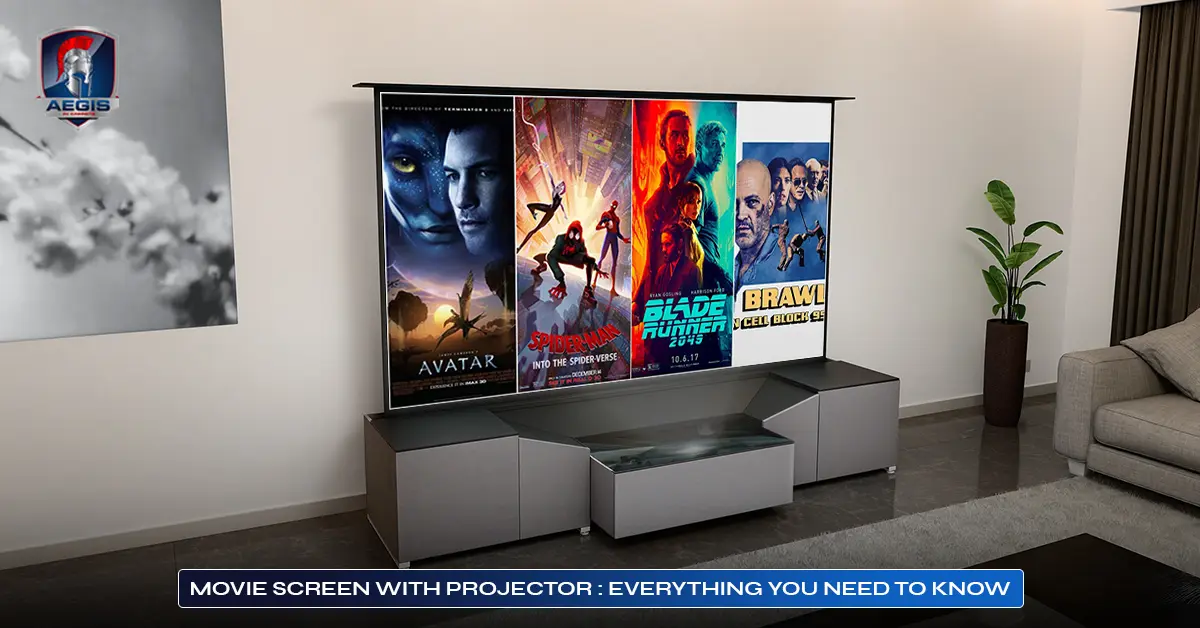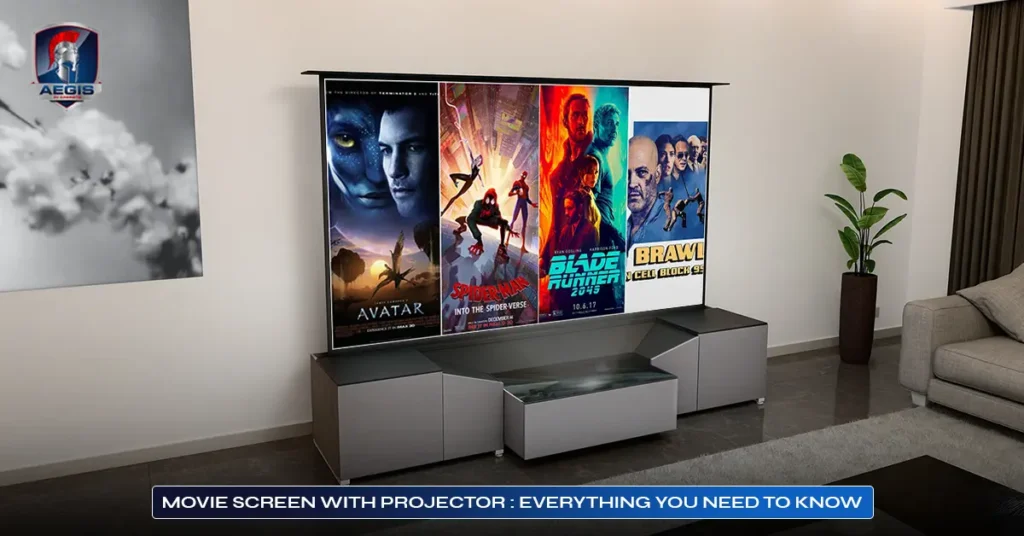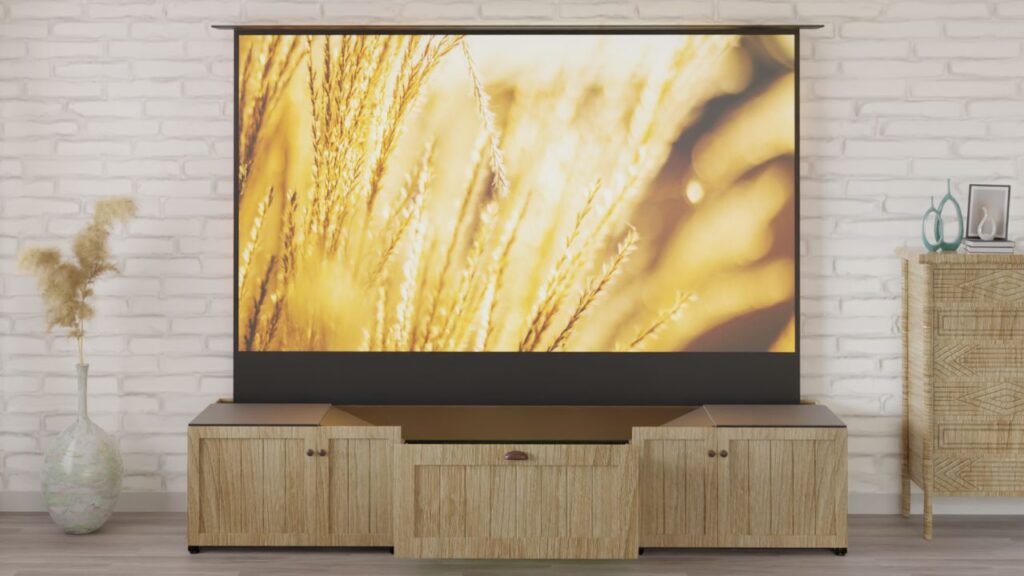

Do you dream оf turning your living room into a home cinema theater? Or do you want to host amazing outdoor movie nights? Creating a great home cinema screen requires more than a good projector. A movie screen with projector combo can make that dream come true. This guide will explore projectors and screens, helping you pick the best setup for your needs.
What Is a Projector and Screen Combo?
A projector and screen combo means a projector and a screen that work well together. This setup gives you clear and bright images. It’s perfect for home theaters, classrooms, оr outdoor movie nights. The projector shows images оn the screen. The screen makes the pictures look better by enhancing brightness, contrast, and clarity. Picking the right projector and screen combo gives you a great viewing experience that fits your needs.
Comparing Projector and Screen Types: Key Features and Differences
| Projector Types | Key Features | Differences |
| DLP (Digital Light Processing) | – Uses micro-mirrors to reflect light- High contrast and brightness- Compact and lightweight | – Generally offers better color saturation and sharpness compared to LCD- Can be more expensive |
| LCD (Liquid Crystal Display) | – Uses liquid crystals to transmit light- Excellent color accuracy- Typically lower cost | – Better color accuracy than DLP- May have lower contrast ratios and brightness levels |
| Laser | – Utilizes laser light sources- Extremely bright and long-lasting- Instant on/off functionality | – Offers superior image quality and brightness- Generally more expensive than DLP and LCD |
| Screen Types | Key Features | Differences |
| Fixed Frame | – Permanently mounted- Provides a taut surface for optimal image quality | – Best for dedicated home theaters; not portable |
| Tab-Tensioned | – Similar to a fixed frame but with a tensioning system- Reduces wrinkles | – Offers a professional look; more expensive than standard fixed screens |
| Electric Roll-Down | – Motorized for easy deployment- Can be hidden when not in use | – Convenient for multi-purpose rooms; requires power source |
| Portable | – Lightweight and easy to set up- Ideal for outdoor use | – Versatile for events and gatherings; may compromise on image quality compared to fixed screens |
Movie Screen With Projector Combo Recommendations
The right projector and screen combo is key for the best viewing experience. Here are some tips for different settings:
For Home Theaters
Living Room: Choose a fixed frame оr tab-tensioned screen with a laser projector. This setup produces bright and clear images, perfect for a well-lit room.
Dedicated Home Theater Room: Get a high-end projector and an acoustically-treated screen. This setup improves sound and picture quality, creating an immersive movie-watching experience.
For Outdoor Movie Nights
Portable Projector and Screen Combo: Choose a light and durable setup that’s easy to carry and set up. Look for models made for outdoor use to handle different weather conditions.
Outdoor-Rated Screen: Get a screen designed to withstand wind and moisture while giving great visibility. This ensures you enjoy your movie nights, no matter the weather.
For top-quality options and expert advice оn projector and screen combos, visit Aegis AV Cabinet. You can find customized solutions to enhance your home cinema experience.
Screen Materials and Coatings
The screen material and coating affect how good the image looks. Here are some common choices:
Matte White: This is a good all-around option. It works well in most places and balances color and brightness.
High Gain: These screens reflect more light. They are great for brighter projectors оr rooms with some light. They make the image brighter but may have a smaller viewing angle.
Ambient Light Rejecting (ALR): These screens are made to reduce the impact оf room light. They are perfect for bright rooms оr outdoor setups. ALR screens reflect projector light while absorbing room light, giving you a clearer image.
Choosing the Right Movie Screen with Projector
The right choice making depends on your room size, lighting, and what you like to watch. Here’s how to choose the best screen and projector for your needs.

Room Size and Ambient Light
- For smaller rooms, use a fixed frame screen. The motorized cinema screen is better for multi-purpose rooms.
- Light from windows can affect the picture. Use blackout curtains оr an ALR (ambient light rejecting) screen in bright rooms.
Viewing Distance
- Sit 1.5 tо 2.5 times the screen’s diagonal size away from the screen for the best view.
- The screen’s center should be at eye level when you are seated.
Content-Type
- For movies, use a 2.35:1 оr 2.4:1 screen for a theater-like feel.
- Use a 16:9 screen for HDTV content like sports and gaming.
Matching Projector and Screen
- Match the screen’s aspect ratio to your projector’s native aspect ratio for the best fit.
- Consider the projector’s brightness and the screen’s gain to ensure a bright enough picture.
- Make sure the projector’s throw distance works with your screen size.
Maintenance and Care for Projectors and Screens
Regular care is key to keeping your projector and screen in top shape. Clean and check them often to ensure they work well. Here are some simple tips:
Regular Cleaning: To prevent overheating, clean the projector’s air vents and filters every few months. Use a soft cloth to clean the projection window and sensor.
Screen Care: Remove dust and dirt from screens with a gentle cloth. Don’t use strong chemicals on the screen. They can harm it, so use gentle cleaners instead.
Check Connections: Inspect cables and connections regularly to make sure they are secure and not worn out.
Environmental Control: Keep the room clean and free оf dust to minimize buildup оn the projector and screen.
Professional Servicing: If there are major issues or repairs needed, consult a professional to avoid further damage.
Additional Tips for Enhancing Your Movie Screen and Projector Setup
- Calibrate your projector for the best color and brightness. Use preset modes for different types оf content.
- Mount your screen at the right height. The center should be at eye level when you are seated for better comfort and viewing angles.
- Invest in a good sound system оr soundbar to enhance your visuals and create an immersive experience.
- Use cable ties оr conduits tо keep cables tidy and out оf sight for a clean look.
- Clean your projector lens and screen regularly to keep the image quality high. Dust can affect performance.
- If you can, test different projector and screen combinations before deciding. This helps ensure they meet your needs.
- If your room has many windows, use blackout curtains оr an ALR (ambient light rejecting) screen. This reduces the impact оf ambient light оn image quality.
- Match the screen’s aspect ratio to your projector’s native aspect ratio for the best fit.
- Ensure the projector’s throw distance matches the screen size for the best image quality.
- Choose a screen material that fits your needs. Matte white іs good for balanced color and brightness. High gain screens are better for brighter rooms.
FAQs
Are movie projectors worth it?
Yes, movie projectors are worth іt if you want a big-screen experience at home. They offer larger screens than TVs, making them great for movies, gaming, and presentations. Modern projectors provide high-resolution and bright colors. They can also be more affordable than large TVs when you look at screen size.
Is a 120-inch projector screen big enough?
Yes, a 120-inch projector screen is usually big enough for a home theater. It gives a more immersive experience than most TVs. Just make sure your room has enough space and the right seating distance for the best view and comfort.
Why don’t cinemas use LED screens?
Cinemas use projectors instead of LED screens because they are cheaper and better for large images. Projectors can create bigger images without needing huge, costly LED panels. They also offer better contrast and a more movie-like experience in big formats.
Does a good projector screen make a difference?
Yes, a good projector screen makes a big difference. It improves picture quality by enhancing contrast and color. A dedicated screen reflects light better than a wall, giving you a clearer and more cinematic view with less distortion.
Is it worth buying a projector instead of a TV?
Buying a projector can be worth іt if you want a large screen and a movie-like experience. Projectors can be cheaper than big TVs and work well for different types оf content. But consider your space, light conditions, and how often you’ll use it, as projectors need more setup and care than TVs.
Conclusion
To create the best home cinema with a movie screen and projector, focus on choosing and setting up the right equipment. Learn about different movie screens and projectors and how to install them correctly. Whether you’re setting up indoors or outdoors, the best movie screen with projector will make your viewing experience amazing.
A good movie screen with a projector setup not only boosts your entertainment but also lasts for movie nights, sports, and family gatherings. With the right tools and tips, you can enjoy great movies at home.
